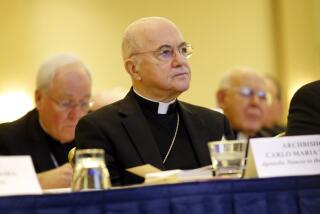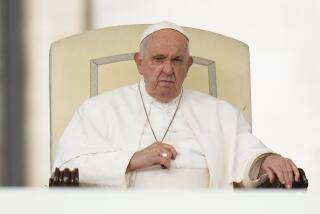RELIGION : Dismissed Bishop: A Media Martyr? : French prelate used TV and magazine interviews to air controversial ideas. Then the Vatican took away his diocese.
- Share via
PARIS — When the Vatican summoned Bishop Jacques Gaillot to Rome, he was otherwise occupied. In fact, France’s outspoken liberal prelate was in Haiti visiting President Jean-Bertrand Aristide, another priest who has had disputes with the Holy See.
Call it an omen.
Gaillot eventually made it to Vatican City, where he was dismissed last week as head of the diocese in Evreux, west of Paris, becoming the first French bishop since World War II to be so harshly disciplined.
The firing of Gaillot had much of France up in arms this week. Several thousand of his supporters took to city streets throughout France on Sunday to protest. And even Roman Catholic priests complained publicly about what they saw as an attempt to silence one of their own.
The volume of the protests reflected deep and growing divisions between the Vatican and large numbers of Catholics in France. Although 80% of the French people call themselves Catholics, many fewer go to church regularly or adhere strictly to church doctrine on birth control or abortion.
Priests in the Mission of France said they were “stunned and appalled” by the dismissal of Gaillot, whom they called “a free voice in the church, defending justice and the dignity of man.”
The church “likes to cherish its martyrs,” observed the Paris daily newspaper Liberation. “But it also has the art of making them.”
For his part, the 59-year-old bishop seemed almost relieved as he joined protesters occupying a Paris welfare office this week, helping them press their demand for increases in aid to young people without homes or jobs.
After more than a decade of facing threats of disciplinary action, Gaillot said he felt a new sense of freedom.
“Now that I’ve become an outsider of sorts,” he said, smiling serenely, “maybe my determination will be even more vigorous than before. I’ve found a certain freedom to speak and act.”
Gaillot gets to keep his title and pension. But, after his final sermon on Sunday, he will become, on paper at least, the bishop for Partenia, a diocese in Mauritania that disappeared long ago. In other words, he’ll be a bishop in title but without jurisdiction.
In the Vatican’s view, Gaillot’s transgressions were numerous, troubling and cumulative.
He had gained a reputation as an advocate for social outcasts, including homosexuals, immigrants and the homeless. But, in the course of that work, he became a particularly outspoken liberal, blithely taking positions directly opposed to the teachings of the church.
He publicly supported the ordination of married priests, the rights of homosexuals and the use of condoms to prevent the spread of AIDS.
He was, as the French like to say, “mediatique,” a tall, photogenic man who loved to use television’s power to get his message across. “Several minutes on television,” he once said, “is worth gold.”
In the view of some of his more conservative brethren, though, he didn’t spend enough time in his cathedral and wasn’t discriminating enough in his choice of news outlets.
He regularly gave interviews to magazines catering to homosexuals, and, earlier this year, the bishop drew a rebuke from the head of French bishops, Joseph Duval, for airing his differences with the Vatican on the frothy talk show “Frou-Frou.”
“What are you looking for?” Duval demanded in a letter. “Your personal success? You can no longer advance on the path you have taken.”
But Gaillot frequently defended his use of the media. “A bishop must join the people here, where they are,” he said. “And for this, the media are necessary to spread the word.”
*
Gaillot, the son of wine merchants, seemed to court controversy almost from the moment he became a bishop in 1982. He publicly supported French conscientious objectors and seemed to relish taking positions diametrically opposed to Catholic leaders in France.
A day after joining the homeless demonstration this week, Gaillot joined a protest demanding freedom for a 31-year-old prisoner fighting extradition from France to Italy, where he faces a 22-year sentence for terrorism.
As for Gaillot’s future, the bishop speaks of helping AIDS victims, working with prisoners or maybe writing a book.
“The church certainly wants to marginalize me, to lessen the weight of my voice,” Gaillot said. “But I will not keep silent.”
More to Read
Sign up for Essential California
The most important California stories and recommendations in your inbox every morning.
You may occasionally receive promotional content from the Los Angeles Times.











